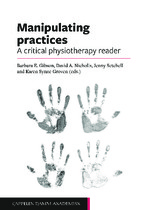| dc.contributor.author | Rowe, Michael | |
| dc.date.accessioned | 2018-01-31T13:39:49Z | |
| dc.date.available | 2018-01-31T13:39:49Z | |
| dc.date.issued | 2018 | |
| dc.identifier.citation | Rowe, M. (2018). A critical pedagogy for online learning in physiotherapy education. In, Manipulating practices: A critical physiotherapy reader (Eds. Gibson, B., Nicholls, D., Setchell, J. & Synne Groven, K. (2018). Cappelen Damm Akademisk, Norway | en_US |
| dc.identifier.isbn | 9788202550011 | |
| dc.identifier.uri | http://hdl.handle.net/10566/3449 | |
| dc.description.abstract | In order to graduate physiotherapy students who are able to thrive in increasingly complex health systems, professional educators must move away from instrumental, positivist ideologies that disempower both students and lecturers. Certain forms of knowledge are presented as objective, value-free, and legitimate, while others – including the personal lives and experiences of students – are moved to the periphery and regarded as irrelevant for professional education. This has the effect of silencing students’ voices and sending the message that they are not in control of their own learning. While the integration of digital technology has been suggested as a means for developing transformative teaching and learning practices, it is more commonly used to control students through surveillance and measurement. Tis dominant use of technology does little more than increase the cost-effectiveness and efficiency of information delivery, while also reinforcing the rigid structures of the classroom. Physiotherapy educators who adopt a critical pedagogy may use it to create personal learning environments (PLEs) that enable students to inform their own learning based on meaningful clinical experiences, democratic approaches to learning, and interaction with others beyond the professional programme. These PLEs enable exploration, inquiry and creation as part of the curriculum, and play a role in preparing students to engage with the complex and networked systems of the early 21st century. While the potential for pedagogical transformation via the integration of digital technology is significant, we must be critical of the idea that technology is neutral and be aware that our choices concerning tools and platforms have important implications for practice. | en_US |
| dc.language.iso | en | en_US |
| dc.publisher | Cappelen Damm Akademisk | en_US |
| dc.rights | This work is protected under the provisions of the Norwegian Copyright Act
(Act No. 2 of May 12, 1961, relating to Copyright in Literary, Scientific and
Artistic Works) and published Open Access under the terms of a Creative
Commons CC-BY 4.0 License (http://creativecommons.org/licenses/by/4.0/).
This license allows third parties to freely copy and redistribute the material
in any medium or format as well as remix, transform or build upon the
material for any purpose, including commercial purposes, provided the work
is properly attributed to the author(s), including a link to the license, and any
changes that may have been made are thoroughly indicated. The attribution
can be provided in any reasonable manner, however, in no way that suggests
the author(s) or the publisher endorses the third party or the third party’s use
of the work | |
| dc.subject | Critical pedagogies | en_US |
| dc.subject | e-Learning | en_US |
| dc.subject | Online learning | en_US |
| dc.subject | Physiotherapy education | en_US |
| dc.subject | Recent publications | |
| dc.title | A critical pedagogy for online learning in physiotherapy education | en_US |
| dc.type | Book chapter | en_US |
| dc.privacy.showsubmitter | FALSE | |
| dc.status.ispeerreviewed | TRUE | |

